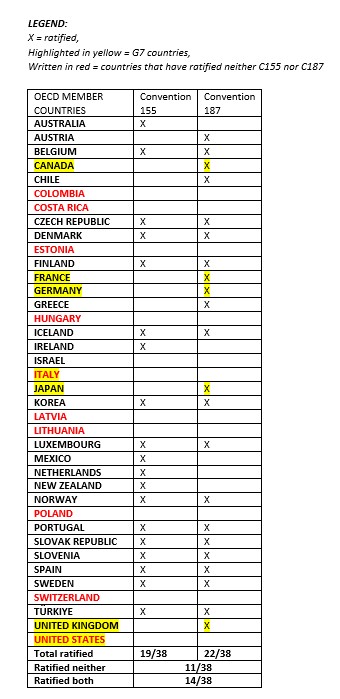11 out of 38 OECD countries have ratified NEITHER of the two fundamental conventions on health and safety at work
28 April 2023
ILO Conventions 155 and 187 are classified as fundamental conventions – meaning that they are considered fundamental principles and basic rights, like the elimination of child and forced labour.
Despite their importance, neither convention has been ratified by 11 OECD countries! No G7 country – all OECD members – has ratified both Conventions.

“The OECD has a critical role to play in promoting workers’ health and safety”said Veronica Nilsson, Acting General Secretary of TUAC. “Ratification of ILO core conventions is a key step to ensure that all workers benefit from a safe and healthy working environment.”‘
“TUAC urges all OECD countries to ratify both conventions immediately.”
“Ratifying universally agreed ILO fundamental conventions is also vital to encourage responsible business conduct and ensure that workers’ fundamental rights are respected in OECD countries and throughout supply chains” added Nilsson.
The OECD promotes occupational safety and health through a number of initiatives and committees, and in a number of including areas including air pollution, chemical hazards, risk management and labour market policies. The OECD also promotes responsible business conduct – and occupational health and safety is an obvious part of it.
‘Convention No. 155 on Occupational Safety and Health provides for the adoption of a coherent national occupational safety and health policy, as well as action to be taken by governments and within enterprises to promote occupational safety and health to improve working conditions.’ https://www.ilo.org/century/history/iloandyou/WCMS_211520/lang–en/index.htm
‘Convention No. 187 is designed to provide for coherent and systematic treatment of occupational safety and health and promote recognition of existing conventions on occupational safety and health’ https://www.ilo.org/global/about-the-ilo/newsroom/news/WCMS_091437/lang–en/index.htm
